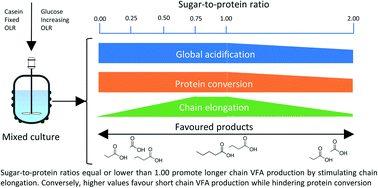Engineering the outcome of cofermentation processes by altering the feedstock sugar-to-protein ratio†
Abstract
This work investigates the impact of the sugar-to-protein (STP) ratio on the outcome of their anaerobic cofermentation in terms of substrate conversion and product selectivity. For this purpose, a continuous stirred tank reactor was operated at pH 7 and fed with casein and glucose at different STP ratios (0.25, 0.50, 0.75, 1.00 and 2.00 in COD basis). Casein conversion was unaffected by glucose presence as long as the ratio was lower or equal to 1. In this range of STP ratio, n-butyric and n-valeric acid production was promoted due to the occurrence and progressive intensification of chain elongation processes. Conversely, STP ratios greater than 1 are associated with lower amino acids consumption, inhibition of the elongation metabolism and lower volatile fatty acids production due to the formation of alternative end products (ethanol, lactate and formate) and unidentified compounds. Interestingly, these negative effects are reversible, as lowering the sugar-to-protein ratio allows to recover protein acidification degree, process productivity and the chain elongation. Overall, this work successfully demonstrates that sugar–protein cofermentation processes can be steered by adjusting their proportions in the feedstock.



 Please wait while we load your content...
Please wait while we load your content...